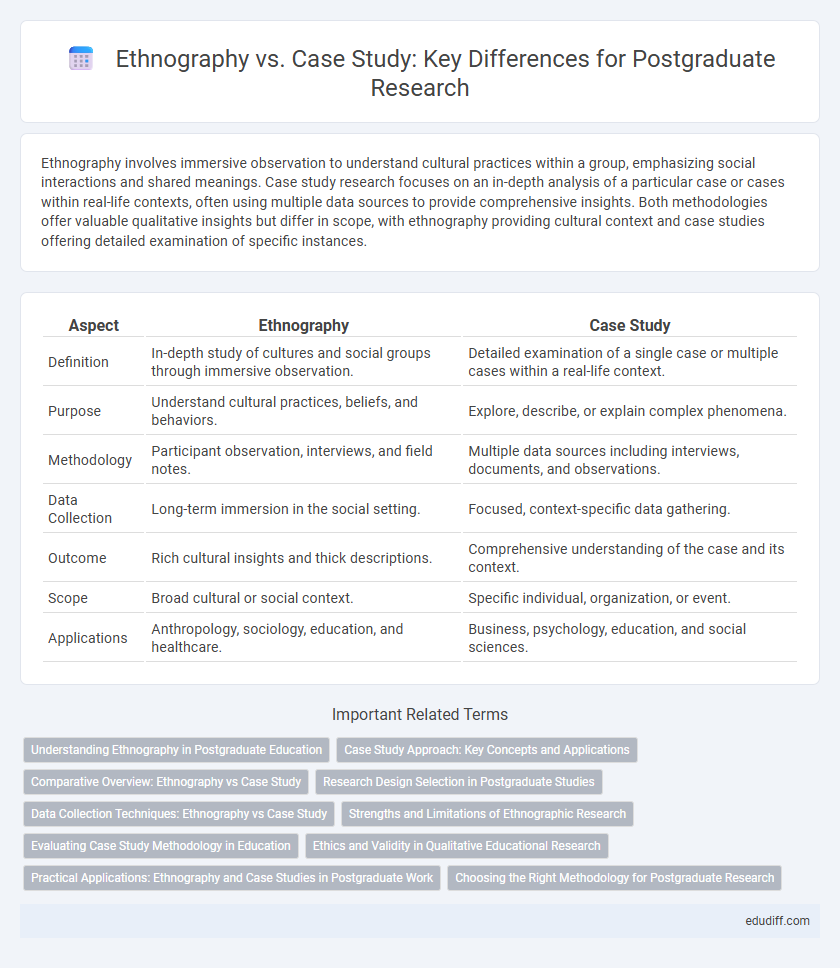Ethnography involves immersive observation to understand cultural practices within a group, emphasizing social interactions and shared meanings. Case study research focuses on an in-depth analysis of a particular case or cases within real-life contexts, often using multiple data sources to provide comprehensive insights. Both methodologies offer valuable qualitative insights but differ in scope, with ethnography providing cultural context and case studies offering detailed examination of specific instances.
Table of Comparison
| Aspect | Ethnography | Case Study |
|---|---|---|
| Definition | In-depth study of cultures and social groups through immersive observation. | Detailed examination of a single case or multiple cases within a real-life context. |
| Purpose | Understand cultural practices, beliefs, and behaviors. | Explore, describe, or explain complex phenomena. |
| Methodology | Participant observation, interviews, and field notes. | Multiple data sources including interviews, documents, and observations. |
| Data Collection | Long-term immersion in the social setting. | Focused, context-specific data gathering. |
| Outcome | Rich cultural insights and thick descriptions. | Comprehensive understanding of the case and its context. |
| Scope | Broad cultural or social context. | Specific individual, organization, or event. |
| Applications | Anthropology, sociology, education, and healthcare. | Business, psychology, education, and social sciences. |
Understanding Ethnography in Postgraduate Education
Ethnography in postgraduate education involves immersive research to explore cultural practices and social interactions within specific communities, providing rich qualitative insights. Unlike case studies that often focus on single events or entities, ethnography emphasizes participant observation and prolonged engagement to capture lived experiences. This methodological approach enhances postgraduate research by offering deep contextual understanding crucial for disciplines like anthropology, sociology, and education.
Case Study Approach: Key Concepts and Applications
The case study approach involves an in-depth exploration of a single unit, such as an individual, group, or organization, within its real-life context to uncover intricate details and causal relationships. Key concepts include bounded systems, multiple sources of evidence, and contextual analysis to provide a comprehensive understanding of complex phenomena. Applications of case studies span various disciplines, offering valuable insights for theory development, evaluation, and practical problem-solving in postgraduate research.
Comparative Overview: Ethnography vs Case Study
Ethnography involves immersive, long-term fieldwork to understand cultural practices and social interactions within their natural context, emphasizing participant observation and qualitative data. Case study research examines specific instances, organizations, or events in depth to explore complex phenomena, often incorporating multiple data sources for comprehensive analysis. While ethnography prioritizes cultural immersion and holistic understanding, case studies provide detailed contextual analysis suited for theory development and practical application.
Research Design Selection in Postgraduate Studies
Ethnography involves immersive, qualitative research focused on cultural contexts, making it ideal for postgraduate studies examining social behaviors and community practices in detail. Case study research emphasizes an in-depth investigation of a single entity or event, suitable for postgraduate research requiring comprehensive understanding of complex phenomena within real-life contexts. Selecting between ethnography and case study depends on research objectives, with ethnography prioritizing cultural insights and case studies providing contextualized knowledge of specific cases.
Data Collection Techniques: Ethnography vs Case Study
Ethnography employs immersive data collection techniques such as participant observation and in-depth interviews to capture cultural contexts and social interactions within natural settings. Case study research utilizes multiple sources like documents, interviews, and archival records to gather comprehensive data focused on a specific case or phenomenon. Both methods emphasize qualitative data but differ in scope, with ethnography centering on lived experiences and case studies on contextual analysis.
Strengths and Limitations of Ethnographic Research
Ethnographic research excels in providing in-depth cultural and social insights through immersive fieldwork, capturing behaviors and contexts that are often inaccessible via other methods. Its strengths lie in rich, qualitative data and comprehensive understanding of participants' lived experiences, but limitations include potential researcher bias, time-intensive data collection, and challenges in generalizing findings beyond specific settings. Unlike case studies, ethnographies prioritize cultural context and participant observation over focused analysis of a single case or event.
Evaluating Case Study Methodology in Education
Case study methodology in education provides in-depth analysis of specific contexts, offering rich qualitative data that captures complex classroom dynamics and learner behaviors. Unlike ethnography, which emphasizes cultural immersion and long-term observation, case studies focus on particular instances or phenomena, allowing for detailed exploration of educational innovations or challenges. Evaluating case study methodology reveals strengths in generating practical insights for policy and practice but highlights limitations in generalizability and potential researcher bias.
Ethics and Validity in Qualitative Educational Research
Ethnography emphasizes prolonged engagement and participant observation, enhancing ethical considerations by fostering trust and informed consent within educational communities, which strengthens data authenticity and ecological validity. Case study research prioritizes ethical rigor through transparent case selection and stakeholder confidentiality, ensuring validity via triangulation and thick description of educational phenomena. Both methodologies demand ongoing reflexivity to address researcher bias and uphold ethical standards, crucial for credible qualitative research outcomes.
Practical Applications: Ethnography and Case Studies in Postgraduate Work
Ethnography offers postgraduate researchers immersive fieldwork techniques to deeply understand cultural practices and social interactions within specific communities, enhancing qualitative data richness. Case studies provide detailed examination of complex phenomena or processes in real-life contexts, allowing for in-depth analysis of particular instances or organizations. Both methods support practical applications by enabling postgraduate students to generate contextual insights crucial for applied research and policy development.
Choosing the Right Methodology for Postgraduate Research
Ethnography involves immersive, long-term observation to understand cultural practices and social interactions within a group, making it ideal for research focused on social dynamics and cultural contexts. Case study methodology centers on an in-depth analysis of a single entity, event, or phenomenon, which is beneficial for exploring complex issues in detail within a specific context. Postgraduate researchers should select ethnography when aiming to capture holistic cultural insights, while case studies suit investigations requiring comprehensive examination of particular instances or processes.
Ethnography vs Case Study Infographic

 edudiff.com
edudiff.com